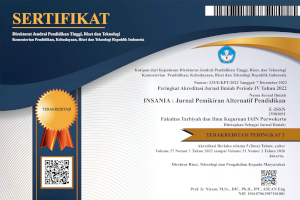Pemikiran Kritis Abu Zaid Terhadap Wacana Keagamaan: Implikasinya Dalam Pengembangan Pembelajaran Teologi di PTAI
DOI:
https://doi.org/10.24090/insania.v12i2.249Keywords:
critical, productive, theology, and active learning.Abstract
: Abu Zaid finds that all religious thoughts have been tightly affected by social, cultural, economic, and political interests and tendencies until there are so many difficulties to differentiate between the essence of Islamic doctrines and their interpretations. Therefore, he tries to deliberate people from such contaminated Islamic doctrines. Alternatively, he calls them to read Islamic sources and thoughts critically, scientifically, and productively. Pedagogically, Abu Zaid’ intellectual capacity had been built for a long time through conducive processes of education and impressive experiences in religious life. Actually, an intellectual capacity Abu Zaid had achieved is a part of ultimate goal of Islamic Higher education. Accordingly, to produce students as smart as Abu Zaid, a lecturer shall apply active learning, a learning that empowers all students along with their all potencies. To give a kind of focused description, this paper just draws an example way of handling an active learning process of class of Theology by which students can develop their thoughts as deliberately as Abu Zaid had done. ÂDownloads
Downloads
How to Cite
Issue
Section
License
Authors who publish with this journal agree to the following terms:
Authors retain copyright and grant the journal right of first publication with the work simultaneously licensed under a Creative CommonsAttribution-ShareAlike License that allows others to share the work with an acknowledgment of the work's authorship and initial publication in this journal.
Authors are able to enter into separate, additional contractual arrangements for the non-exclusive distribution of the journal's published version of the work (e.g., post it to an institutional repository or publish it in a book), with an acknowledgment of its initial publication in this journal.
Authors are permitted and encouraged to post their work online (e.g., in institutional repositories or on their website) prior to and during the submission process, as it can lead to productive exchanges, as well as earlier and greater citation of published work (See The Effect of Open Access).








